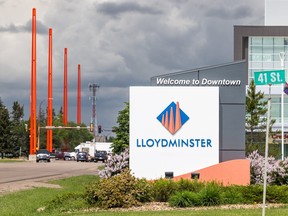Some 114,100 barrels of oil are processed in Lloydminster each day
Article content
OTTAWA — A small border town dubbed Canada’s “heavy oil capital” could be hit hard by a prolonged rail stoppage, says its mayor.
Gerald Aalbers, the mayor of Lloydminster, told the National Post on Wednesday that the city’s residents are “hoping for the best but preparing for the worst” as rail stoppages could wreak havoc on a regional transportation network that’s already operating at near capacity.
Advertisement 2
Article content
“People are doing as much as they can while they still can,” said Aalbers, adding that rail cars leaving the city are filling up quickly.
Some 114,100 barrels of oil are processed each day in Lloydminster, home to both an upgrader and an asphalt refinery, moving downstream through a complex network of railways, pipelines and tanker trucks. Aalbers said that rail is often the most economical mode of transport for Lloydminster-made heavy oil products like asphalt.
Aalbers estimates that a prolonged rail stoppage could slow down the city’s economic activity by 20 to 25 per cent, stressing the interdependencies between oil production and other parts of the local economy, such as the retail and hospitality sectors.
Recommended from Editorial
Aalbers, who is now in his eighth year as mayor, said rail traffic has increased during his time in office, notably as progress on the Keystone XL pipeline project has stalled.
Article content
Advertisement 3
Article content
“It’s been frustrating to see Keystone become a political football south of the border,” said Aalbers, noting that it’s become common to see “110 to 125 tank cars at a time” leave the local rail yard.
“Any capacity we could add to the network would be extraordinarily helpful,” Aalbers continued. “Especially if we want to avoid situations like the one we’re in in the future.”
Aalbers said he’s been in regular communication with the office of Battlefords—Lloydminster MP Rosemarie Falk, who happens to be the Conservative Party’s associate labour critic.
Falk’s office didn’t respond to a request from the National Post to comment.
The rail workers dispute is being watched closely in Western Canada with the export of millions of barrels of oil potentially hanging in the balance.
Canadian crude-by-rail exports averaged 119,077 barrels per day last year, according to data from the Canada Energy Regulator.
Federal Labour Minister Steven MacKinnon met with both Alberta Premier Danielle Smith and Saskatchewan Premier Scott Moe on Wednesday as the hours ticked down toward the midnight deadline set by CN Rail and Canadian Pacific Kansas City (CPKC), Canada’s two largest rail operators.
Advertisement 4
Article content
Shortly after his talk with MacKinnon, Moe said on the social media platform X that the federal government should use “any tools necessary, including binding arbitration” to avert a rail stoppage.
For her part, Smith called on the federal government last week to bring in back-to-work legislation to end the rail dispute.
MacKinnon had not issued an update on the labour dispute as of Wednesday evening, although he did retweet a post from Transport Minister Pablo Rodriguez saying that the rail operators have a “responsibility to Canadians” in the negotiations.
National Post
rmohamed@postmedia.com
Get more deep-dive National Post political coverage and analysis in your inbox with the Political Hack newsletter, where Ottawa bureau chief Stuart Thomson and political analyst Tasha Kheiriddin get at what’s really going on behind the scenes on Parliament Hill every Wednesday and Friday, exclusively for subscribers. Sign up here.
Our website is the place for the latest breaking news, exclusive scoops, longreads and provocative commentary. Please bookmark nationalpost.com and sign up for our politics newsletter, First Reading, here.
Article content








